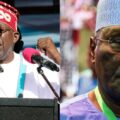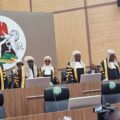The recent decision by the Supreme Court to uphold President Bola Tinubu’s election victory comes as a pivotal moment in Nigeria’s political sphere. Despite fierce opposition from Alhaji Atiku Abubakar and Mr. Peter Obi, the court’s ruling stands firm, supported by a series of critical factors that underscore the validity of Tinubu’s win.
From considerations of compliance to the integrity of the electoral process, the judgment carries profound implications for the country’s governance amid its pressing economic, security, and social challenges.
This analysis provides an insightful exploration of the core reasons that fortified the Supreme Court’s endorsement of President Tinubu’s electoral success, marking a significant milestone in the narrative of Nigeria’s political landscape.
READ ALSO: Breaking: Supreme Court receives conflicting letters from Chicago varsity on Tinubu’s certificate
Here are ten reasons the Supreme Court upheld President Bola Tinubu’s election win:
1. Evidence of Compliance: The court found that the Independent National Electoral Commission (INEC) substantially complied with the provisions of the Electoral Act during the election.
2. Lack of Substantial Influence:It determined that the alleged non-compliance did not substantially affect the election’s outcome, as per section 185(1) of the Evidence Act.
3. Differentiating Portals:The court clarified the distinction between the election result collation system and the IReV portal, emphasizing that the failure of the latter does not hinder the manual collation process.
4. Electronic Transmission Failure: While acknowledging INEC’s failure to electronically transmit election results, the court emphasized that this omission did not directly impact the election results but might reduce the confidence of the voting population.
5. Inadmissible Evidence:The Supreme Court upheld the striking out of evidence from some of Atiku’s witnesses, highlighting that it constituted inadmissible hearsay.
6. Denial of Fair Hearing: The court ruled that raising the issue of President Tinubu’s alleged involvement in a US drug-related case after the respondents had filed their process denied them the right to fair hearing.
7. Lack of Alternative Result: Atiku failed to present an alternative result, and the court deemed the INEC-declared results as correct since there was no contradicting evidence.
8. Presumed Legitimacy of INEC Results: The court presumed the accuracy of the results announced by INEC, which showed President Tinubu as the winner.
9. Resolution of All Issues: The court resolved all the issues raised in Atiku’s petition against him, further solidifying the validity of President Tinubu’s victory.
10. Dismissal of the Appeal: With all issues resolved against the appellants, the court ultimately dismissed the appeal, affirming the judgment of the lower court without ordering costs.
READ ALSO: Tension in presidency: Supreme court deliberates Atiku, Obi, APM’s claim on Tinubu’s win
The Supreme Court’s decision solidifies President Tinubu’s mandate to address Nigeria’s pressing challenges and steer the nation toward progress and stability.








